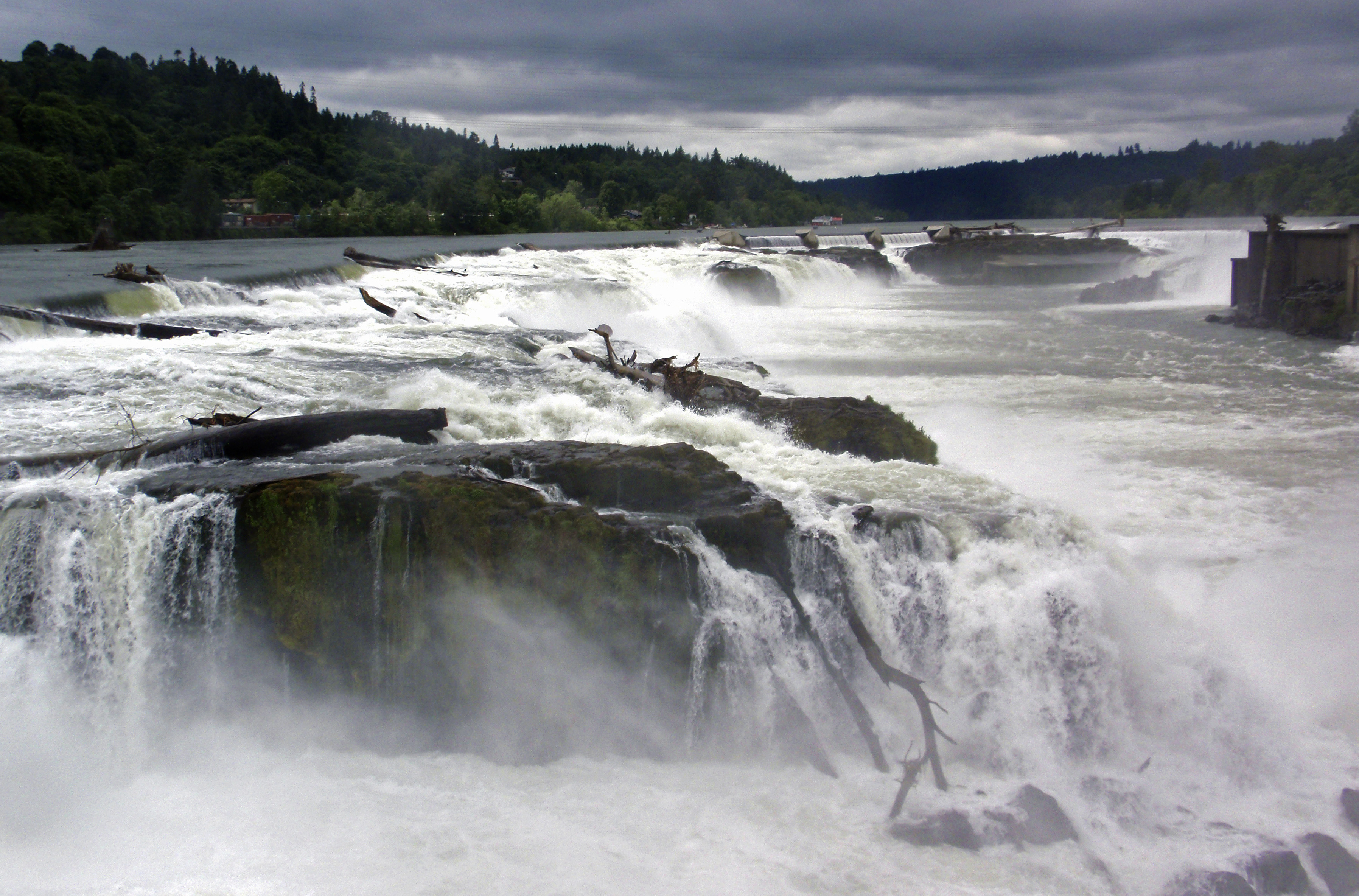Tribal Government & News
Tribe granted permission to intervene in PGE attempt to control Willamette Falls

By Dean Rhodes
Smoke Signals editor
The Confederated Tribes of Grand Ronde will be allowed to intervene as a defendant in Portland General Electric’s legal effort against the Oregon Department of State Lands to condemn a contested five-acre strip at Willamette Falls upon which the Tribe constructed a temporary ceremonial fishing platform in October 2018.
The Tribe requested to intervene on Thursday, May 19, and the request was granted on Thursday, July 7, in U.S. District Court in Portland.
“We are elated that the court has granted the Tribe’s motion to intervene in PGE’s condemnation case at Willamette Falls,” Grand Ronde Tribal Chairwoman Cheryle A. Kennedy said. “We are grateful that the court recognizes that the Tribe’s ceremonial fishery and fishing platform are at stake, and we look forward to representing our own interests in court.”
The Confederated Tribes of Grand Ronde is fighting a move started in early April by Portland General Electric to condemn property in and around the company’s Federal Energy Regulatory Commission boundary at Willamette Falls.
The company’s lawsuit seeks to use PGE's condemnation authority under the Federal Power Act to acquire the Oregon Department of State Land's interest in the property.
PGE is seeking to condemn the land “to safely and securely operate our hydroelectric project consistent with our FERC license obligations.” PGE has operated a hydroelectric facility at the falls for more than 100 years.
The Federal Energy Regulatory Commission is an independent agency that regulates the interstate transmission of natural gas, oil and electricity, as well as hydropower projects like the one at Willamette Falls.
The condemnation move brings back the contentious events that occurred four years ago when the Tribe sought a temporary ceremonial fishing platform at Willamette Falls and competing claims by PGE and the Oregon Division of State Lands were made concerning ownership of the property.
In April 2016, the Oregon Department of Fish and Wildlife granted the Grand Ronde Tribe a permit to catch 15 salmon annually at Willamette Falls for ceremonial purposes.
In May 2018, PGE allowed the Tribe access to the falls from the West Linn side of the river for ceremonies and to scout out possible fishing platform locations, but revoked that access on Sept. 21 after the state granted the Tribe a permit to erect a fishing platform on the contested property.
The Tribe was then forced to ferry materials to construct the platform across the Willamette River from the Oregon City side. The platform was completed on Oct. 23, 2018.
PGE then filed an appeal with the state Land Use Board regarding the Tribe’s fishing platform site because the city of West Linn did not regulate the structure, but the Land Use Board dismissed the appeal in April 2019.
On July 28, 2021, PGE’s Board of Directors approved a resolution that the company would pursue acquiring all of the state’s rights, title and interest in the contested property.
According to the lawsuit, PGE offered the Department of State Lands $150,000 for the state’s claimed right to the property in January, but the offer was not accepted.
Previously, Grand Ronde Tribal Attorney Rob Greene said that an extensive study was conducted by a Department of State Lands consultant who found that the area on which the Tribe installed platform footings belonged to the state of Oregon.
Although the Tribe’s ceremonial fishing was interrupted by the COVID-19 pandemic, the original plans were to install the platform annually at the start of the fishing season in May and remove it at the end of the season in late July. This year, Tribal fishermen and women caught 15 salmon from the rocks because it was too dangerous to erect the platform because of water flows.
In the motion to intervene, the Grand Ronde Tribe contended that PGE’s action is a substantial overreach and is using the Federal Power Act “as a lever to invalidate Grand Ronde’s state-issued registration to operate a fishing platform on state lands at the base of Willamette Falls.”
“PGE’s lawsuit is a massive overreach based on false and misguided concerns,” Kennedy said in May. “If PGE succeeds, not only will it threaten the Tribe’s ceremonial fishery, it will transfer ownership of Oregon’s iconic Willamette Falls from the state of Oregon, and all of Oregon’s citizens, to a private, for-profit corporation.
“Their attack on the Tribe’s ceremonial fishery comes despite the fact that CTGR never crosses into PGE’s property when fishing and harvesting at Willamette Falls and PGE’s past approval of our safety plan. There are more appropriate channels to resolve these issues.”
Kennedy said that PGE Chief Executive Officer Maria Pope told her that the company’s initial support of the Tribe’s efforts to build a ceremonial fishing platform at Willamette Falls ended because of claims raised by other Oregon Tribes that have a business relationship with the company.
Kennedy said that the Grand Ronde Tribe has supremacy as gatekeepers of the falls over other Oregon Tribes because the Clowewalla band of Tumwaters were year-round residents at the fishery.
The Tribe’s motion to intervene included statements from Kennedy and General Manager David Fullerton and adds that the Oregon Department of State Lands did not oppose the motion while PGE objects.
It ultimately is asking for a judgment dismissing PGE’s eminent domain request and awarding of legal costs for the Tribe.
